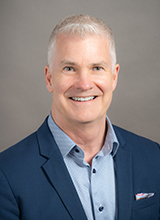
Bill O’Connell, EdD
As part of my faculty appointment, I am Director of the Behavioral Health Support Specialist (BHSS) Workforce Development Project. My responsibilities include oversight of curriculum development, practicum guidelines, development of community partnerships and advocacy for reimbursement pathways.
Behavioral Health Support Specialist Workforce Development Project
I am working with a talented project team to develop a competency framework and curriculum to prepare a bachelor level Behavioral Health Support Specialist (BHSS). A BHSS will deliver brief, culturally responsive, evidence-informed interventions for common mental and behavioral health conditions under supervision in a team-based setting. The BHSS will use a measurement-based care approach to ensure patients are receiving the right level of care at the right dose. Crisis services, integrated care and specialty behavioral healthcare are examples of work environments that will benefit from a BHSS. Our project goal is to support higher educational programs across the state implement the BHSS clinical training program in academic year 25-26. During my time working as a primary care behavioral health consultant, I frequently met with senior patients from diverse backgrounds who had never spoken with a behavioral health provider in their lifetime despite experiencing moderate to severe symptoms of a mental or behavioral health condition. One reason I found unacceptable was lack of access to services. The bachelor level Behavioral Health Support Specialist role is one solution of many to improving access to care and expanding the available workforce.
Scholarship
My current scholarship focuses on behavioral health workforce development and best practices in teaching and training bachelor level intervention specialists for behavioral health settings. In addition to my current role as BHSS project co-investigator, I served as principal investigator for a philanthropic gift from Robert Craves to expand access to school counseling services at Bailey Gatzert Elementary School in the Yesler Terrace neighborhood of Seattle. I also engaged in community-based research with Village Spirit Center for Community Change and Healing located in the Central District to produce a mental health needs assessment for residents who had experienced homelessness prior to obtaining secure housing. Previous peer reviewed publications focused on counselor preparation for employment in behavioral health agencies, best practices in counselor preparation and ethical dilemmas in counselor practice.
Certification and Licensure
I am a Licensed Mental Health Counselor (LMHC) in the State of Washington and a Licensed Professional Counselor (LPC) in Colorado. Additionally, I am a National Certified Counselor (NCC), and an Approved Clinical Supervisor (ACS) through the National Board of Certified Counselors and the Center for Credentialing and Education.
Career Roles
- Associate Professor (WOT), Psychiatry and Behavioral Sciences, University of Washington (2022-Present).
- Regional Director of Behavioral Health and Primary Care Behavioral Health Consultant for One Medical Seniors (2018-2021)
- Department Chair of Leadership and Professional Studies at Seattle University (2014-2017)
- Associate Professor of Clinical Mental Health and School Counseling at Seattle University (2010-2019)
- Associate Professor of Clinical Mental Health and School Counseling at Xavier University in Ohio (2001-2010)
- Past President of the Ohio Counseling Association (2006-2009)
- Assistant Clinical Director for Talbert House Inc. (1998-2001)
- *Private Practice Therapist and Consultant (1997-2010)
- Adult Therapist for Clermont Counseling Center in Milford, Ohio (1994-1997)
- Crisis Intervention Specialist for Talbert House Inc. (1990-1993)
- Adult Therapist for Care Unit Chemical Dependency Hospital in Ohio (1988-1990)
*I owned a private practice in the Greater Cincinnati Area for twelve years providing behavioral medicine consultation in an integrated pain management practice, clinical consultation to behavioral health organizations, and training and education on ethical and professional issues for mental health providers. Additionally, I provided individual, couple and family counseling in a group psychology practice with a special focus on serving the LGBTQI+ community and persons with trauma history.
Education
Primary Care Behavioral Health Certificate, UMASS Chan Medical School, 2019
Doctor of Education in Counselor Education and Supervision, University of Cincinnati, Cincinnati, Ohio, 2002
Master of Arts in Counseling, Athenaeum of Ohio, Cincinnati, Ohio, 1991
Bachelor of Arts, University of Dayton, Dayton, Ohio, 1986
Department Affiliations
Scholarly Expertise
- Community mental health
- Community-based partnered research
- Health behaviors
- Primary care
- Psychotherapies
- Training
- Ethical dilemmas in professional practice
Clinical Expertise
- Primary Care Behavioral Health for Seniors
- Geriatric Counseling
- Brief interventions (specifics)
- Cognitive behavioral therapy (CBT)
- Collaborative Care / Integrated Care
- Crisis intervention
- Motivational Interviewing (MI)
- Safety Assessments
- Suicide prevention
- Solution Focused Counseling
- Psychodynamic Therapy
Teaching Philosophy
I worked as a full-time clinician in addictions, mental health and private practice settings for ten years before I decided to pursue a doctorate. This professional experience influenced the manner in which I conceptualize courses, construct learning objectives, assess student learning, and evaluate the impact of higher education on student self-efficacy in clinical settings. In my teaching I emphasize the link between research, practice and training. Courses, including assignments, need to adapt to emerging knowledge so that the students of today are prepared to improve upon the work of their predecessors. For me, teaching is an investment in a better future.
Recent Publications
(2024 Oct 1)
Psychiatr Serv 75(10): 1042-1044
O'Connell WP, Renn BN, Areán PA, Raue PJ, Ratzliff A
Show complete publication list »
